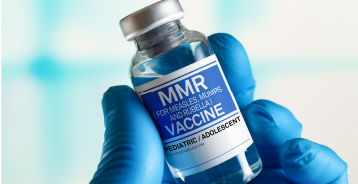Prevent mumps and measles
 Medical Conditions
Medical Conditions
We need to process your personal information for you to interact with this website. We also use Cookies to enhance your experience. Please accept the Website Ts and Cs and Data Protection and Privacy Policy to fully access the website.
What is tuberculosis?
Tuberculosis (TB) is an infectious lung disease. Although bacteria (not a virus) causes TB, the infection spreads in the same way as COVID-19 – from one person to another through tiny droplets released from the nose or mouth into the air. It’s the leading cause of death in South Africa and one of the top ten causes of death worldwide.
However, someone you know and spend a lot of time with is more likely to infect you than a stranger. Fortunately, TB can be prevented and those who are infected, but who have received the correct treatment for at least two weeks are not contagious anymore.
Latent vs active TB
Healthcare practitioners make a distinction between latent (inactive) and active TB. If you’re diagnosed with latent TB it means that you have a TB infection, but the bacteria is inactive, so you don’t have any symptoms. You’re also not contagious, but it’s important that you receive and complete treatment so that it doesn’t turn into active TB.
Active TB is contagious in most cases. Active TB may occur within the first few weeks after you’ve been infected with TB bacteria. It may even occur years later. Symptoms include coughing that lasts three or more weeks, coughing up blood, chest pain, fever, night sweats, fatigue, loss of appetite, unintentional weight loss. TB can also affect other parts of your body via your bloodstream, including your brain, spine, joints, liver, kidneys and heart. When left untreated, TB can be fatal.
Who is most at risk?
Anyone is at risk of contracting TB. However, if you have a weakened immune system that can’t successfully fight TB bacteria, you’re more at risk than others. For example, if you have been diagnosed with diabetes, severe kidney disease, HIV/AIDS, or certain cancers, you may be more at risk of contracting TB.
Substance abuse, excessive alcohol and tobacco use also increase your risk of a TB infection as these substances weaken your immune system.
Your risk is also higher if you’re a healthcare provider who treats patients with TB, or if you live or travel to areas with high rates of TB or drug-resistant TB. Areas include Africa, Asia, Russia, Eastern Europe, Latin American and the Caribbean Islands.
TB and COVID-19
South Africa saw a large drop in TB diagnoses during 2020, which can possibly be ascribed to how the COVID-19 pandemic disrupted TB services. This could lead to an increase in TB fatalities. TB testing and primary healthcare access fell by between 9% and 25%, according to South African Health Minister, Dr Zweli Mkhize. According to the World Health Organization (WHO) Global Tuberculosis Report 2020, the pandemic threatens to reverse efforts in the global reduction of TB.
However, wearing a mask to help prevent the spread of COVID-19, could also help to prevent the spread of TB.
COVID-19 services could also benefit TB services in the long-term, according to an article published in The Lancet. For example, COVID-19 screening could be repurposed to expand TB screening.
Prevention and treatment
Infants in countries where TB is common are often vaccinated to prevent severe TB. Vaccines which should be effective in adults, are in various stages of development and testing.
If you have an increased risk of a TB infection, it’s important that you’re screened for latent TB. If you test positive, you may be prescribed medication to reduce your risk of developing active TB and infecting those around you. It’s important that you finish your course of prescribed medication so that the TB bacteria strain you have doesn’t become drug-resistant and, therefore, difficult to treat.
If you’re diagnosed with active TB, it’s also very important that you finish your course of prescribed medication. You may be treated for TB for a few weeks before you’re no longer contagious. To protect your family and friends from getting TB while you’re recovering:
You can help
Though TB is a wide-spread, serious lung disease, it is preventable and treatable. Vaccinate infants, practice good hygiene, book your TB screening (especially if you’re at risk) and complete your course of prescribed medication to help prevent the spread of TB.
Bestmed offers paediatric immunisations, including a vaccine for tuberculosis for infants 0 to 2 months old, as a preventative care benefit across all options.